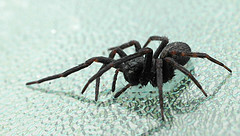Spiders belong to a group, or genus, called Arachnids, which also includes scorpions and ticks. There are over 30,000 different species of spiders around the world and they come in a broad range of sizes, from the tiny to large enough to eat frogs, birds and small mammals. Baby spiders usually live on plant nectar, and some adult spiders are vegetarian, feeding on leaves.
Most spiders, however, are carnivorous and use various methods, from intricately spun webs or trapdoors to simply leaping on their prey, to catch their food. Depending on the species of spider, this prey can include anything from:
Some of the larger species of spider will eat frogs, small mammals such as mice and even birds. Although some spiders will crunch up their food with their powerful jaws, spiders never chew their food. Once it has been caught and killed, often by poison injected through their fangs, spiders will insert a digestive enzyme into the prey. They then wait until the prey animal has dissolved into a kind of juice and simply suck this juice up.
Ticks, by the way, will sometimes turn the table and attach themselves to larger spiders to feed on them. Apart from being eaten by spiders, ticks have a lot of other natural enemies. Many birds, including pheasants eat ticks as do various rodents, shrews and ants. Fire ants in particular like to make a meal of ticks and are known to have quite an impact on tick populations. In addition, some wasps will lay their eggs in engorged ticks, using them as food for their parasitic larvae.
Most spiders, however, are carnivorous and use various methods, from intricately spun webs or trapdoors to simply leaping on their prey, to catch their food. Depending on the species of spider, this prey can include anything from:
- wasps
- flies
- butterflies
- dragon flies and any other kind of flying insect
- beetles
- earwigs
- ants
- crickets
- grasshoppers
- cockroaches
Some of the larger species of spider will eat frogs, small mammals such as mice and even birds. Although some spiders will crunch up their food with their powerful jaws, spiders never chew their food. Once it has been caught and killed, often by poison injected through their fangs, spiders will insert a digestive enzyme into the prey. They then wait until the prey animal has dissolved into a kind of juice and simply suck this juice up.
Ticks, by the way, will sometimes turn the table and attach themselves to larger spiders to feed on them. Apart from being eaten by spiders, ticks have a lot of other natural enemies. Many birds, including pheasants eat ticks as do various rodents, shrews and ants. Fire ants in particular like to make a meal of ticks and are known to have quite an impact on tick populations. In addition, some wasps will lay their eggs in engorged ticks, using them as food for their parasitic larvae.

